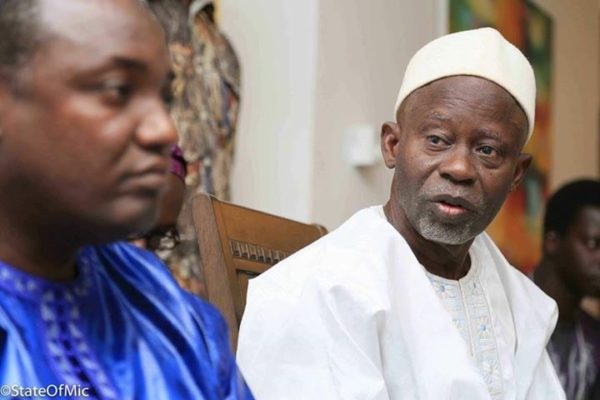
It’s all making sense now. The pieces are falling into place. The events that surround the United Democratic Party (UDP) intraparty squabbles are somewhat confusing, yet there is method to the implacable tension, a system; a science. In short, it’s deja vu all over again. This phrase is, of course, tired, even boring. It’s a cliché fraying at the seams.
But, the confluence of events around the widening political chasm between President Barrow and his political benefactor, the UDP, is no mystery. And President Adama Barrow is no anomaly. Not by any stretch of the imagination. He’s a product of the times; a wimp, a hack, an embodiment of Yahya Jammeh’s Jedi complex, and much like Bilbo, very much a Tolkien intergalactic character whose ephemeral presence in Gambia’s political discourse is often expressed in micro-aggressions shaped by a venomous disdain for political opposition and underpinned by an insatiable appetite for political power. President Barrow’s manifestation of that quintessential African pathology, an insidious hunger for power, stands in stark contrast to the Gambia’s democratic experiment.
In the new Gambia, nothing is more medieval than the sight of dimwit; President Adama Barrow, not unlike his predecessor, relishing the fawning of poor citizens, a tradition that ridicules the concept of democracy and contemporary governance. This politics of patronage bleeds out the democratic experiment, and is an aversion to the Weberian theory of bureaucracy and good governance.
President Barrow is not only projecting a passion for messianic reverence; a sanitized caricature of Yahya Jammeh, he is gloating over the embers of the fledgling democracy that he so callously set ablaze. President Adama Barrow’s high-handed paternalism and rambling brawls, typically demonstrate the irrationality of strong-arm leaders; a sharp deviation from Gambian’s collective desire for democracy. A Pavlovian conditioning is again taking shape, and not unlike Stockholm syndrome, it modifies the minds of poor citizens and the vulnerable into tractable zombies. The crushing weight of this historical mind control, a relic of the past, recently became patently obvious in the efforts to ban on-line criticism of President Barrow and his government.
But, what dwarfs everything that is wrong and evil about the Gambia’s government is the steady train of citizen groups that have disgustingly started to prostrate in total submission to President Barrow. As was customary under Yahya Jammeh’s regime, President Barrow too is robbing the Gambian people wrong way. The era of lifting public officials to celestial reverence, at the expense of individual dignity, must end.
Yet, this is not the worst part. That has to be President Barrow’s perennial chiding of the Gambian diaspora, and his efforts at proscribing the interactive political discourse imperative in Gambia’s democratic maturation. Contending that the past year and half of the Coalition government was thoroughly challenging to the point of exasperation, would be an understatement. Collectively, Gambians have reached saturation point in political intolerance.
It, thus, comes as no surprise that this is evidently because President Barrow has so soon gravitated towards manoeuvring the political system, in his usurpation of political power. President Barrow’s tilt towards insubordination of Gambia’s democracy, to his singular lust for power, was discernible and apparent earlier on as both a forewarning and antidote to the usual convenience of political complacency. Typically, Gambians have chosen to bury their heads in the sand, rather than stick their necks out for what’s politically just, irrespective of who leads.
Today, if hardly anyone noticed President Barrow’s slow coercion of power and domination of the other two branches of government, it’s was because the novelty of political power consumed Gambian politicians, and drew their attention away from the resurrection of the terrifying politics of the past.
As is customary, it is so easy to relapse into the comfort of painful political inertia, even as the politics and governance of the moment are counter-intuitive to the national interest. President Barrow, as a bad dream, is emblematic of the juxtapositioning of greed and moral deficit, which together defined Gambia’s past two decades. The materiality of this characterization to the Gambia’s psychopathology is undeniable. In a way, this should be the political awakening that failed us the last time. It’s as if Niccolò Machiavelli is animating President Barrow most visceral impulses.
The underbelly of the political morass in Gambia is more than just the dissembling of a nation’s collective aspiration; it’s the abuse of power, which Gambians are allowing to fester, once again. Coming out of two decades of monotheism, what’s arising out the State House is a throwback to an appalling period of abuse and political incompetence, which should propel every Gambian into apoplectic rage. President Barrow cannot be indemnified from gratuitously plunging the Gambia into another political crisis, a revival of the bad governance of the past, and an obstacle to economic development, which hamstrings the geniuses of our people, and constraints Gambian’s vibrant aspirations.
In this era of Gambia’s rebirth, political hyperbole and empty bluster have no place in the nation’s politics. The movement to concretize Gambian’s common aspiration must take precedence over greed, self-centeredness and narrow-minded singularity, as showcased in the vanity and narcissism so often vividly demonstrated during President Adama Barrow’s short stint in political office. Besides, the arch of history will not be so kind to the Coalition government for its dismissiveness of the Gambian diaspora, who collectively, and with peerless nationalism, evangelized Gambia’s return to democracy.
Of all the past Gambian administrations, the Coalition government is, hands down, the most clueless, vengeful and recklessly contemptuous of all the issues citizens count as gravely unsettling. The uncommon level of arrogance this government has routinely displayed will not inundate citizens’ collective voices and voracious appetites for the political change that Gambians fought and died for.
By leveraging the infinite power of the collective, the Gambian people will reject the renascence of imperial rule, in the effort to establish a government that affords equal opportunity to citizens, regardless of the archaic, superficial cultural and class constructs. A paroxysm of uneasiness has swamped Gambian’s consciousness, and agitated more calls for political change. And as Gambians reassert the tenets democracy and an end to President Barrow’s flirtations with imperial power, his desire to retain power is a paradox to contemporary Gambian politics. Politically, the Gambia is in an apocalyptic state, and President Barrow is an unbearable political enigma that belongs to the dustbin of history.
By Mathew K Jallow











Recent Comments